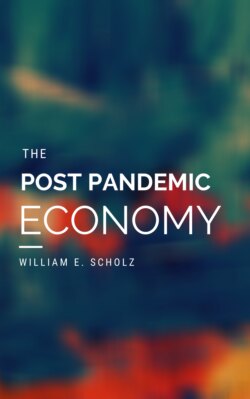Читать книгу The Post Pandemic Economy - William E. Scholz - Страница 21
На сайте Литреса книга снята с продажи.
Example #2: A "Self-Made" Crisis
ОглавлениеMismanagement of the National economy occurs frequently throughout history. For our purpose, we identify mismanagement of economic resources as grossly financing overly ambitious schemes for growth. Has the American Nation sought to grow or expand its influence too rapidly in the 20th century? How has this effected the American Economy and has that led to a weakened economic state during the coronavirus epidemic?
All growth needs financing. However, America has financed catastrophic wars in the Middle East to the tune of trillions of taxpayer dollars, that never amounted to peace or profit. An estimate from the Pentagon concluded that the United States Government spent $6.4 trillion on primarily War in the Middle East, and Asia since 2001 [4]. This is a staggering figure and approximately the amount needed to shore up a response to the coronavirus. Just think, if America didn't enter into needless wars in the Middle East, it could have had a reserve to handle the coronavirus.
The root causes of loose Government budgetary controls are special interests. Special interests can leverage a debt-based financial system for their own benefit, especially a system led by the fractional reserve policies of the Federal Reserve. This doesn't have to be the case. The New, Global Financial Order, an order that is not debt-based, will inherently prevent the largesse of special interests as it weans Nations off a debt-based system.
The dominant political narrative in both major parties, at the time of writing, is war weariness. The American public knows the true cost of the wars in the Middle East, most importantly in human life and sacrifice, and of second importance the financial cost. Built upon manipulated intelligence, the war in Iraq and Afghanistan is without question one of history's most significant examples of imperial overreach.
To finance the wars, special interests turned to the American consumer. By halting large-scale building projects, repurposing a larger portion of discretionary spending to war finance, and running a budgetary deficit, the United States economy financed misguided and disastrous expansion efforts. The crisis of ‘08-09 and Post Pandemic have element causes of a self-made crisis. America shot itself in the foot.
There are plenty examples throughout history of a self-made crisis. The most famous is Napoleon's spin-out war to crown himself emperor of Europe with disastrous financial results for France. Another apt example is Napoleon III who failed to anticipate the financial crisis of 1857-1858. The financial crisis of '57-58 was part of a global downturn, but internal mismanagement of the French economy caused internal strife [5]. The case of Napoleon III is more subtle, but worthy of exploration because of the lack of understanding of how a Nation's internal economics translate into economic growth ala "economic development."
In addition to appropriate budgetary controls, Nations must finally understand how to create an internal environment conducive for economic development. Few topics in politics, at all levels, are debated as much as economic development. And everybody thinks they know exactly what to do!
The truth is that most economic development initiatives fail. They fail to provide an adequate return on investment, or they dissolve when the political will for the project or initiative evaporates. Economic development must be radically curtailed in its current form and privatized.
In addition to imperial overreach, Nations can undergo a financial crisis due to poor internal economic development strategies. Financial overreach and project bloat can lead to disaster. The debt-based economic order is unforgiving and harsh, especially for development countries, in this regard, who may not have the expertise and know-how to successfully complete large-scale economic development initiatives. Further, they may not have a robust enough private sector to complement Government spending.
Nations, again, must refocus their financial order on the creation of real wealth, not the appeasement of special interests. There is no question that the current debt-based order contributes significantly to internal mismanagement and self-made crises, but also "spin-out war."
Identifying the cause of overly ambitious war, such as America's misguided wars in the Middle East, is a paradox. What starts what? What comes first? Was it a need for American Imperialism that started the wars in the Middle East or was it the mismanagement of the economy that caused the need for American Imperialism? Whatever the case, the outcome is clear.
Rural and smaller communities in the United States shoulder the cost of lives and their sons and daughters go to war on behalf of special interests. These are the communities that lose in the debt-based financial order.
The debt-base order always leads to spin-out conflict, whether that is global in nature during the failure of a combination of the larger Nation-State economies and International financial organizations or whether wars occur in a "proxy" nature as subtle encroachments of National interests abroad. In either case, it is unsustainable. The workers of the world can no longer shoulder the burden of a debt-based order.
The Greatest fear for policymakers in the financial aftermath of the coronavirus is global conflict. The likelihood of a Great War increases with each new loan originated.
